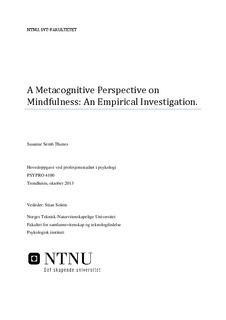A Metacognitive Perspective on Mindfulness: An Empirical Investigation
Master thesis
Permanent lenke
http://hdl.handle.net/11250/271168Utgivelsesdato
2013Metadata
Vis full innførselSamlinger
- Institutt for psykologi [2970]
Sammendrag
The aim of this study was to explore the differences and similarities between mindfulness and metacognitions, and to investigate how these constructs relate to symptoms of psychiatric disorders. The Five Facet Mindfulness Questionnaire (FFMQ), the Metacognitions Questionnaire 30 (MCQ-30), the Patient Health Questionnaire 9 (PHQ-9), the Generalized Anxiety Disorder Assessment 7 (GAD-7), and the Obsessive-Compulsive Inventory Revised (OCI-R) were administered electronically by the use of social media and online forums, and 224 people completed all five questionnaires.
The FFMQ factors of non-judge and awareness were significantly correlated with all of the MCQ factors, while observe, non-react and describe showed weak and varying correlations. Through forward regression analyses the MCQ factors measuring negative metacognitions, uncontrollability and danger and need to control thoughts, was found to be important predictors of symptoms of psychiatric disorders. Awareness and nonreact were found to be the FFMQ factors most important in predicting symptoms of psychiatric disorders. The findings supported both the metacognitive model, and parts of the mindfulness model.
